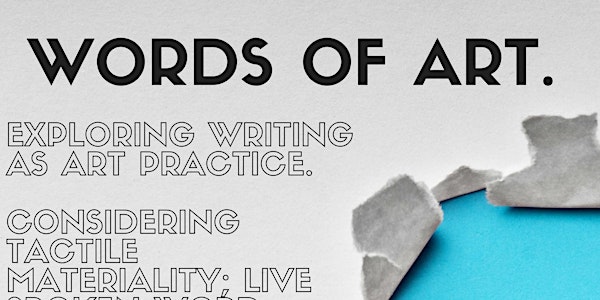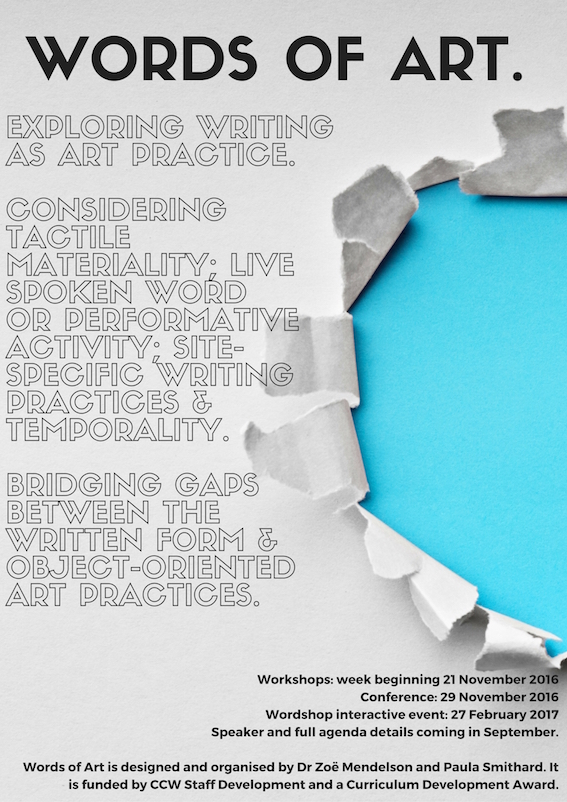
Words of Art - conference
Date and time
Location
Wimbledon College of Arts
Merton Hall Road London SW19 3QA United KingdomDescription
Words of Art seeks to explore writing as art practice by extending relationships to writing towards considerations of tactile materiality, live spoken word or performative activity, site-specific writing practices and temporality - bridging gaps between the written form and object-oriented art practices. The project aims then to shift the focus of writing from the computer screen to the studio and seeks to break down the perception of barriers between writing on the one hand and art-making on the other.
Tuesday 29th November:
Half-day CONFERENCE in the Lecture Theatre at Wimbledon College of Arts
2 – 5:30 pm
Inviting practitioners who use written forms within their own practices and those who are involved in curating and publishing artist’s writing. The conference is convened by Dr Zoë Mendelson and Paula Smithard, and is supported by The Teaching and Learning Exchange at UAL via Curriculum Development Funding.

Speakers and Perfomers:
Ami Clarke: A performance of Low Animal Spirits with Error-Correction: an introduction to future diagrams, performed at the ICA in December. This is a live HFT algorithm trading in world news by Ami Clarke and Richard Cochrane.
'Error-Correction: an introduction to future diagrams (take 7)’ is one in a series of experimental takes of an on-going enquiry into diagrams, that reference and include appropriated texts, contemporary commentary; news items, as well as anecdotal evidence, culminating in an interrelated convergence of many interwoven threads, whereby the voice, through language, is constituted “between someone else’s thoughts and the page’. Take 7 focus’ on materiality, algorithms, and an evolving subjectivity, with a particular focus on Capitalism and Schizophrenia: Contemporary Visual Culture and the Acceleration of Identity Formation/Dissolution by Jonah Peretti – founder of Buzz-feed.
Rachel Cattle: Cattle’s research asks what we might learn by employing oblique and sideways strategies linked to counter cultural and intuitive approaches. Discoveries brought about by becoming a stylus and the reinvestigation of experimental and overlooked work by artists and writers (often women) are cut-up and re-examined both digitally and live as improvised, looping performances and works utilising text, drawing, print, object, voice, and video.
‘…history cannot be easily mapped onto women writers who are so often engaged in the opposite activity: actively searching out predecessors and models instead of feeling oppressed by them…’ (Maggie Nelson).
If, as Eileen Myles says, the revolution is ‘the woman turning’ and her radical perception is that ‘the woman is here’ and ‘the room is gigantic’, it is prescient that a reinvestigation and re-imagining of the work of (often female) experimental writers, artists and musicians, seen at the margins, takes place, crossing freely between forms and disciplines. Counter cultural and intuitive methods and ideas might in this way be reignited and brought into focus by employing oblique and sideways strategies connected to radical and feminist histories and via ideas such as Kristeva’s ‘women’s time’, a ‘confusion of the spatial and temporal…which is resistant to the chronological and the linear.’ (Laura Mulvey)
Rachel Cattle will explore recent works including a series of radio broadcasts entitled The Yellow Book and Witch Dance, an experimental text around which other works revolve and intersect.
Dr Zoë Mendelson: Discussing the role of fiction in theory, with particular attention to the case study in psychoanalysis. Mendelson's practice-based research questions diagnostic criteria inherent to psychological definitions and engages disorder as a culturally produced phenomenon, in parallel to its clinical counterpart, suggesting its value to knowledge production within Fine Art and critical theory. In this talk – with an accompanying animation - she will identity ways in which psychological ‘evidence’ could present as fiction and will look at their shared traits.
Dr Neil Chapman: Discussions on writing in the context of art practice are often framed as a matter of boundaries, emphasising the territorial claims of one discipline over another. Such issues may be important, not least for artists contextualising their work in relation to literature. At the same time, discussions framed this way are badly placed to appreciate the issues that diverse practitioners have in common. This paper proposes that shared politics are emerging across disciplines of art and literature. The contemporary phenomenon of artists who take up writing practices cannot be understood sufficiently as a new or renewed form of art practice. Instead, it needs to be thought of as a kind of resistance—one that is immanent to art practice but that does not progress the concerns of the discipline in any of the ways that might be expected. Artists’ writing practice need not be thought as the capturing of territory nor as art by other means. It can be understood as a way of working with unexpected partners to chart an extra-disciplinary realm, discovering new potentials in the present and new implications for the future.
Sharon Kivland: is an artist and writer. She is Reader in Fine Art at Sheffield Hallam University and an editor at EROS Press. Her work considers what is put at stake by art, politics, and psychoanalysis:
Reading Nana is part of my general project of ventriloquism, speaking / writing as and for another. I take it upon myself to write as the lovely commodity in Marx’s Capital, rather often as Sigmund Freud, and more recently, as Jacques Lacan, among other instances. Today, however, I will select some Nanas for you. Allow me to explain: I have been reading Nana by Émile Zola for some time now, over quite a few years. Zola’s novel, his ‘true story’ of the demi-monde, was published in instalments, first appearing in October 1879 in the Voltaire. The definitive version in book form was published on 15 February by Charpentier. I read and I re-read the book, in both French and English. I digest the book, condensing it, organising it into themes, appearances; yes, I assimilate it. Sometimes I read (some might say perform) my assimilations. I have danced one, according to Jean-Luc Godard’s film version, and invited others to join me (they rarely do so). Some parts of my reading have been published, in instalments. Over time I am assembling a whole novel that is largely incomplete. Yet, Nana or Nana eludes possession, no matter how many times she is had or read. She escapes the grasp. Her value lies in that she can be exchanged.
Dr Dean Kenning will discuss the Social Body Mind Map – a diagrammatic tool to enable critical reflection on one’s art work with respect to unconscious process and social forces. He will locate the SBMM in the context of diagrammatic theory, and in particular with diagramming as a method of representational thinking that combines words and images. Kenning proposes that we can think of diagrams not just as statistical and explanatory tools, but also as exploratory tools. By way of example he will draw a SBMM.
Stella Capes works across a variety of media including video, performance, photography and sculpture, generating situations that explore the vulnerability and pathos of human endeavour.
For Words of Art she will be screening Knights Move Thinking, 2012. Utilising the narrative voice alongside the vernacular of film, performance and painting, the work brings into question our reading of visual space and plays with the languages that construct our perception of it.
Ted Targett is a Stage 3 Painting student and will be presenting a new work, In the Silence, Light